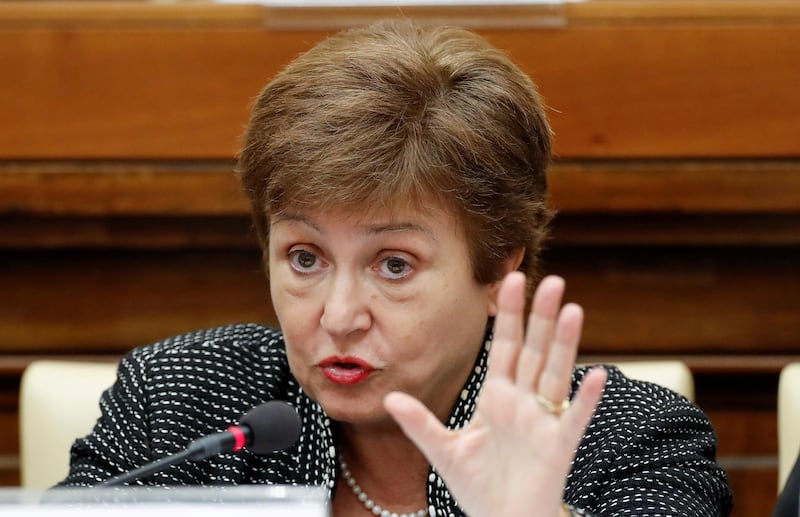The International Monetary Fund is set to revise upward its forecast for the global economy in 2020 following better-than-expected growth in the second and third quarter, but warned of record debt levels and a "partial and uneven recovery" in 2021.
The Washington-based lender made a "small upward" revision of its economic growth forecast as "the picture today is less dire" than its June projections of a severe global contraction, Kristalina Georgieva, the IMF's managing director said in remarks prepared for delivery on Tuesday.
The revised growth forecast will be released in the coming week as the IMF and World Bank hold their annual meetings virtually October 12-18. In June, the IMF projected the global economy will contract 4.9 per cent in 2020 due to the impact of Covid-19, followed by a gradual recovery of 5.4 per cent expansion in 2021.
"The global economy is coming back from the depths of the crisis," Ms Georgieva said. "But this calamity is far from over. All countries are now facing what I would call ‘The Long Ascent’—a difficult climb that will be long, uneven, and uncertain. And prone to setbacks.”
The Covid-19 pandemic has unleashed the worst recession since the 1930s Great Depression, disrupted global supply chains, hampered international trade and dealt a blow to key sectors from aviation to shipping. Governments have provided around $12 trillion in fiscal support to households and firms, according to the lender.
Globally, the pandemic has claimed more than 1 million lives, according to tracking data from Worldometer. The number of people infected passed 35.7 million, while more than 26.8 million have recovered.
Despite the slightly improved forecast for the year, the IMF's chief warned of "extraordinary" uncertainty— depending on faster progress on vaccines or an increase in virus outbreaks that could accelerate or derail the long ascent. There are currently more than 170 vaccine candidates at various stages of development.
Risks remain high with rising bankruptcies, stretched valuations in financial markets and peak debt levels. Many countries have become more vulnerable as their debt levels have increased because of their fiscal response to the crisis and heavy output and revenue losses.
"We estimate that global public debt will reach a record-high of about 100 percent of GDP in 2020," Ms Georgieva said.
Addressing growing debt vulnerabilities will be a key theme of the World Bank and IMF’s virtual annual meetings next week.
The world also faces the risk of "severe economic scarring" from job losses, bankruptcies and the disruption of education.
As a result of this loss in capacity, the IMF expects global output to remain "well below" its pre-pandemic projections over the medium term. This will be a setback to the improvement of living standards for almost all countries, it warned.
"This crisis has also made inequality even worse because of its disproportionate impact on low-skilled workers, women, and young people," Ms Georgieva said. "There are clearly winners and losers—and we risk ending up with a Tale of Two Cities. We need to find a way out."
The IMF outlined four immediate priorities. The lender emphasised safeguarding people’s health and stepping up essential measures such as spending on treatment, testing and contact tracing. It recommended strengthening international cooperation to coordinate vaccine manufacturing and distribution, especially in the poorest countries.
It called for maintaining lifelines across economies, to firms and workers — such as tax deferrals, credit guarantees, cash transfers, and wage subsidies. Continuing monetary accommodation and liquidity measures are also important to ensure the flow of credit, especially to small and medium-sized firms—therefore supporting jobs and financial stability.
"Cut the lifelines too soon, and the Long Ascent becomes a precipitous fall," Ms Georgieva said.
The lender emphasised that flexible and forward-looking fiscal policies are needed for economies to bounce back. The crisis has triggered structural changes that need governments to re-allocate spending and labour to support the transition. This means stimulus for job creation, especially in green investment, and cushioning the impact on workers by retraining, reskilling and expanding unemployment insurance.
"Safeguarding social spending will be critical for a just transition to new jobs," Ms Georgieva said.
Finally, the IMF highlighted the need to address debt, particularly in low-income nations, who require immediate help to prevent the reversal of development gains made over decades. This includes access to more grants, concessional credit and debt relief and better debt management and transparency.
In some cases, global coordination to restructure sovereign debt will be necessary, with the full participation of public and private creditors.
Reforms are needed to build a more resilient economy that is greener, smarter, more inclusive and more dynamic, Ms Georgieva said.
Increasing public investment by just 1 per cent of GDP across advanced and emerging economies can create up to 33 million new jobs, according to the lender.
The IMF has reached more than $280 billion in lending commitments to 81 countries and is ready to lend more from its $1tn budget, she said.
"Joined by a single rope, we can overcome the crisis and achieve a more prosperous and more resilient world for all," Ms Georgieva said.








